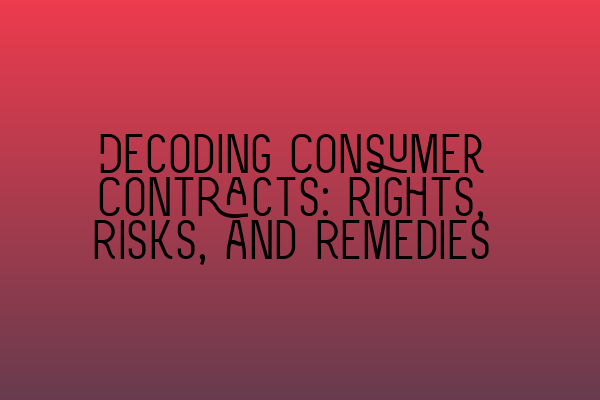Decoding Consumer Contracts: Rights, Risks, and Remedies
Consumer contracts are an integral part of our daily lives, governing the transactions we make as consumers. Whether it’s purchasing goods, signing up for a service, or entering into a lease agreement, we encounter consumer contracts in various forms. However, understanding the terms, rights, risks, and remedies in these contracts can often be a daunting task.
As a consumer, it’s important to be aware of your rights and obligations when entering into a contract. This knowledge empowers you to make informed decisions and protects you from potential risks. In this blog post, we will decode consumer contracts, exploring the key elements, potential pitfalls, and available remedies.
The Key Elements of Consumer Contracts
Consumer contracts typically consist of several key elements that outline the terms of the agreement between the consumer and the business. These elements include:
- Offer and acceptance: The contract begins with an offer made by the business and the consumer’s acceptance of that offer.
- Consideration: Both parties must provide something of value in the contract, whether it’s money, goods, or services.
- Terms and conditions: This section outlines the rights, obligations, and responsibilities of both parties.
- Price and payment terms: The contract specifies the price of the goods or services and the agreed-upon payment terms.
- Delivery and performance: If applicable, the contract will include details about the delivery of goods or the performance of services.
- Dispute resolution: The contract may include provisions for resolving disputes, such as arbitration or mediation.
Understanding each of these elements is crucial to ensure clarity and fairness in the contract.
Potential Risks in Consumer Contracts
Consumer contracts can expose individuals to various risks. Some common risks include:
- Unfair terms: Businesses may include unfair terms in their contracts, such as excessive cancellation fees or the ability to unilaterally change the terms without notice.
- Misrepresentation: Businesses may misrepresent the goods or services they offer, leading consumers to make decisions based on false information.
- Hidden fees: Contracts may include hidden fees or charges that aren’t clearly disclosed to the consumer.
- Unconscionable conduct: In some cases, businesses may engage in unconscionable conduct, taking advantage of consumers’ vulnerability or lack of knowledge.
Recognizing these risks is essential for safeguarding your rights as a consumer.
Consumer Rights and Remedies
Fortunately, consumer protection laws provide a range of rights and remedies to protect consumers in contractual relationships.
Some of the key rights include:
- Right to information: Businesses must provide consumers with clear and accurate information about the goods or services being offered.
- Right to fair terms: Contracts must not contain unfair terms that place consumers at a disadvantage.
- Right to a cooling-off period: In certain cases, consumers have the right to cancel a contract within a specified period.
- Right to refunds and repairs: If goods are faulty or services are not provided as agreed, consumers have the right to seek remedies such as refunds or repairs.
When facing issues with a consumer contract, there are several possible remedies available:
- Negotiation: In some cases, a dispute can be resolved through negotiation between the consumer and the business.
- Mediation: Mediation involves a neutral third party assisting in reaching a resolution that satisfies both parties.
- Alternative dispute resolution (ADR): ADR methods, such as arbitration, can be used to resolve disputes outside of court.
- Litigation: If all else fails, consumers can seek legal remedies through litigation, taking the matter to court.
It’s important to be aware of your rights and explore the available remedies when faced with contractual disputes or breaches.
Stay Informed and Protected
As a consumer, knowledge is your best defense against potential risks in consumer contracts. Stay informed about your rights and obligations and be vigilant when entering into contractual agreements.
If you’re preparing for exams or looking for additional resources to enhance your understanding of contract law, be sure to check out these related articles:
- SQE 1 Practice Exam Questions
- SQE 1 Practice Mocks FLK1 FLK2
- SQE 2 Preparation Courses
- SQE 1 Preparation Courses
- SRA SQE Exam Dates
By staying informed and seeking guidance when needed, you can navigate consumer contracts with confidence and protect your rights as a consumer.
